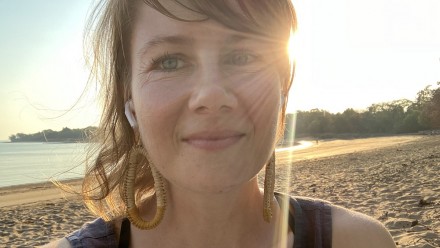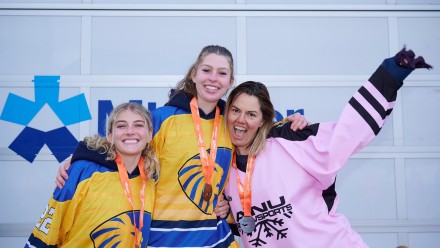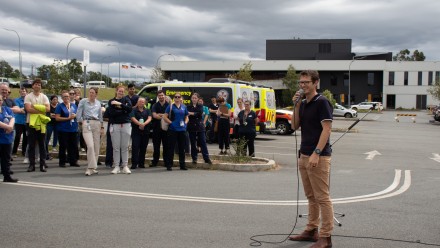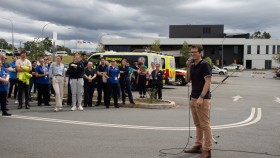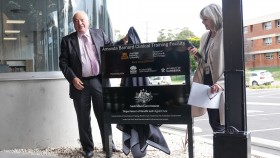Pandemic pressures and women's health
I am an obstetrician and gynaecologist. I chose to serve in this profession to help minimise taboos and stigma around women's health.
My background is a melting pot of cultures. As many from a culturally diverse background will testify, I am also often asked the question 'where are you from?’ to which I respond by saying ‘have a guess’! I can count on one hand how many people get it right.
I was born to mathematician academic parents; and education, i.e. teaching and constantly learning is in my DNA. My birth country is Pakistan, but I grew up in Africa before moving to Australia. I am proud of my multicultural heritage and my fluency in many languages.
I live and work in the beautiful Northern Beaches of Sydney. The recent opening of the new hospital at Frenchs Forest provided a wonderful opportunity for me to set up an innovative healthcare service for women and their families called ‘Women’s Health Road’. I am the Director of this multidisciplinary medical practice which is run out of a cottage located opposite the hospital. It was an interesting exercise to develop a multidisciplinary care model during the pandemic. We have won the staff lottery (phew!), having an amazing reception team as well as multidisciplinary clinicians who offer sessions at WHR. We now have part-time GP specialists who have further increased the variety of conditions related to women’s health managed in-house including lactation-based interest. No team is ever complete without a practice nurse and midwife, as well as a women's health physiotherapist. We are also lucky to have a colorectal surgeon working collaboratively with us, allowing management of perineal tears, endometriosis and prolapse.
It gives me particular pride to provide culturally safe care. The 2021 Census found that almost half of Australians have a parent born overseas; and the population of people from the subcontinent continues to increase significantly. It gives me great joy to know that it is not uncommon for 3 different languages to be simultaneously spoken in various rooms of the WHR Medical Centre, including Spanish and Italian.
My niche is caring for women with heavy menstrual bleeding (HMB), particularly around perimenopause. This is an area which is underdiagnosed and often trivialised. My mission is to raise awareness around the multiple management options that exist for women that suffer from HMB, as well as encourage clinicians to be proactive when women do reach out for treatment. This is a truly treatable problem, and it makes me sad to see so much unnecessary suffering and compromised quality of life.
The pandemic created another layer of complexity for women's health. Apart from the concerns around isolation and anxiety around safety of vaccination, I was truly worried that women would downplay their symptoms and delay screening procedures. Abnormal uterine bleeding can be caused by underlying hyperplasia or malignancy, which makes early diagnosis extremely important. While we in Australia are fortunate to have a robust cervical screening program, there is no doubt that women did put off clinical assessment and review. This was particularly prevalent among migrant women, who often face issues around health literacy, uncertainty of how to access care, socio-economic disadvantage, and minimal support as they can miss the extended family structure they previously had.
I was part of multiple community health awareness programs, including in Hindi/Urdu, focusing on COVID-19 and pregnancy, information on vaccines, and education and advocacy for health screening programs and importance of timely medical assistance for gynaecological symptoms.
Given the acceptance of virtual health care and development of sophisticated digital health platforms during the pandemic, we are looking at strategic digital health-based research at WHR in 2023, to understand how to narrow some of the existing gaps and optimise patient engagement/shared decision making. It is also important for the private industry to contribute to education/training – we are working towards setting up an extended skills term for a rural based GP trainee. We regularly host and mentor various students through our practice, aiming to increase confidence of the younger generation by seeing firsthand how women can thrive in their career choices.
Women of colour are significantly underrepresented in the work force and especially in senior positions of leadership. Thankfully there is a momentum to create more balanced places of work so that the community comes out on top with more leadership progression options for them. Diversity in the workplace yields other benefits like increased productivity and improved patient health outcomes. My advice to women of colour in health care is to understand the reality of systemic barriers that exist in the current set up and continue to be part of the change, difficult though that can be many at time, and invest your finite time and energy in productive paths so that your talent is valued. I think a prime example is the Link and Grow program - thank you so much for the opportunity to contribute to this amazing initiative!





